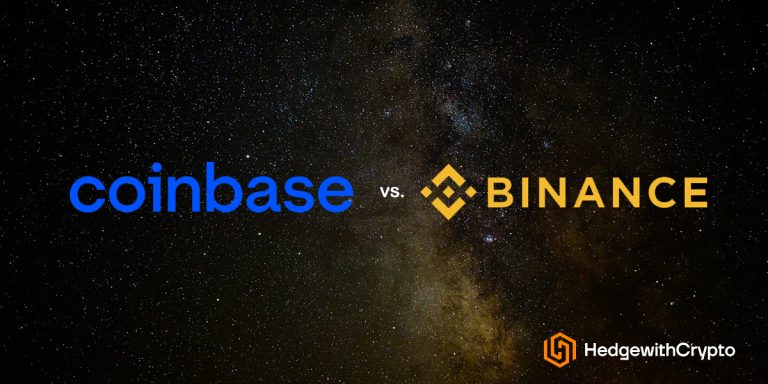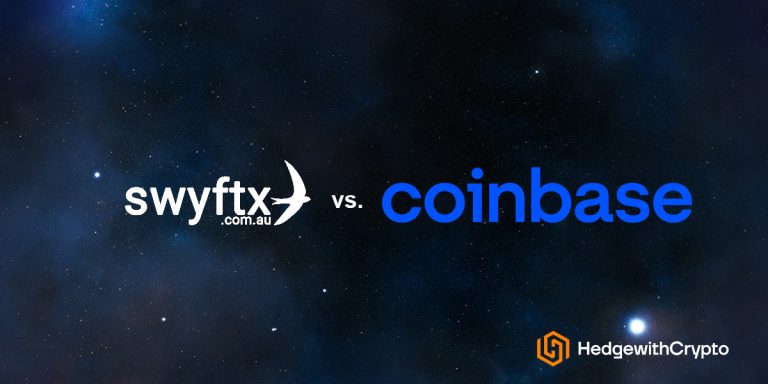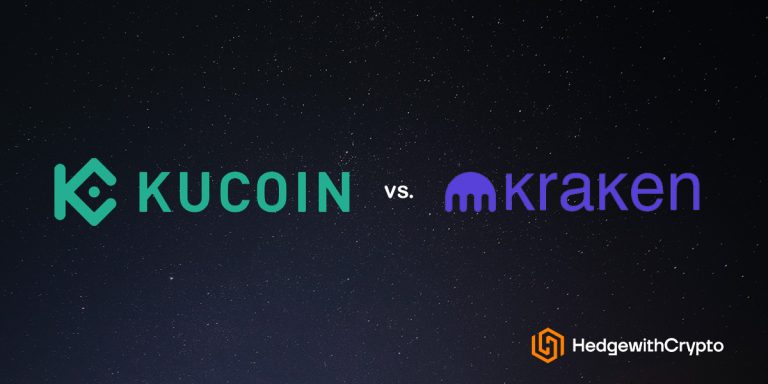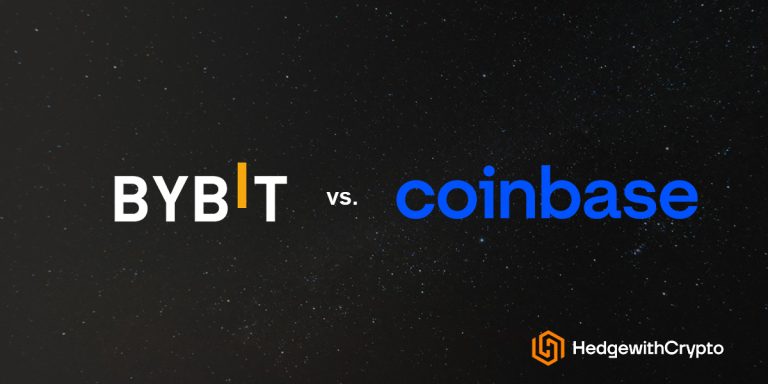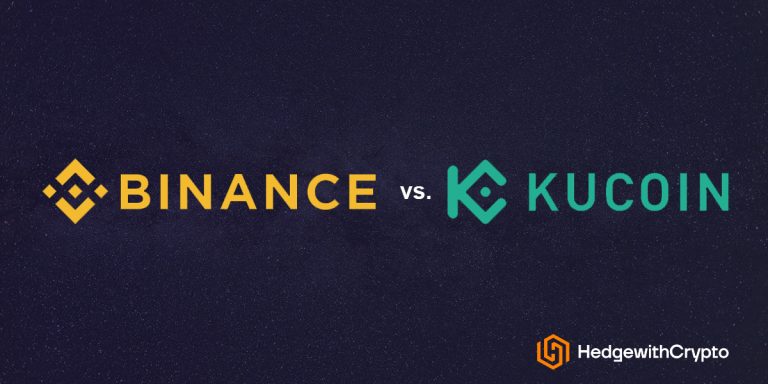We may earn a commission from links on our site, but this doesn’t affect our reviews. Learn more.
Hedge With Crypto is an independent publisher that provides objective and free content. Articles on our site may include links to our partners. If you click on these links, we may earn a commission. However, our editorial content remains unbiased, reflecting our own opinions or the general information available. For more information on our company policies, read the Affiliate Disclosure, Privacy Policy, and Terms & Conditions.
Coinbase vs KuCoin: Which Should You Choose?
Hedge with Crypto aims to publish information that is factual and accurate as of the date of publication. For specific information about a cryptocurrency exchange or trading platform please visit that provider’s website. This information is general in nature and is for educational purposes only. Hedge with Crypto does not provide financial advice nor does it take into account your personal financial situation. We encourage you to seek financial advice from an independent financial advisor where appropriate and make your own inquiries.
TABLE OF CONTENTS
Quick Verdict
Beginners wanting a safe, simple way to accumulate cryptocurrency will enjoy the user experience of Coinbase. The platform has a reputation for security, solid customer support, and working well with government regulators. KuCoin is a far more complicated exchange with less regulatory oversight. More experienced users looking for crypto features and advanced trading options will prefer KuCoin’s low fees and the 700+ supported assets to trade.
Coinbase vs KuCoin: At A Glance
| Coinbase | KuCoin | |
|---|---|---|
| Website |
|
|
| Promotion | $5 BTC bonus (USA only) | Up to 500 USDT in bonuses |
| Fiat Currency | USD, GBP, EUR, CAD, SGD, NZD & AUD | USD, GBP, EUR, CNY & 46 others |
| Supported Cryptocurrency | 241 | 806 |
| Max. Trading Fee | 0.4% (maker), 0.6% (taker) | 0.1% |
| Overall Rating | HedgewithCrypto Score 4.7 / 5 We provide an overall weighted average rating out of 5 stars. Our ratings are based on objective criteria like the ease of use, fees, deposit methods, customer support and availability. Our reviews are not influenced by 3rd parties. Click here for further information about our rating methodology and a full list of categories we review against. Visit Coinbase |
HedgewithCrypto Score 4.6 / 5 We provide an overall weighted average rating out of 5 stars. Our ratings are based on objective criteria like the ease of use, fees, deposit methods, customer support and availability. Our reviews are not influenced by 3rd parties. Click here for further information about our rating methodology and a full list of categories we review against. Visit KuCoin |
| Review | Read our full Coinbase Review | Read our full KuCoin Review |
Coinbase Overview
Coinbase is one of the world’s longest-running cryptocurrency exchanges, founded in 2012 by Americans Brian Armstrong and Fred Ehrsam. In nearly a decade of servicing customers, the platform has built a reputation for simplicity, security, and innovation. Coinbase boasts a registered user base of 100 million+, a testament to the business’s dedication to evolution within a constantly changing industry.
Most investors will be hard-pressed to find a platform that provides an easier way to diversify their portfolios and buy Bitcoin and other altcoins. In addition to its excellent user experience, Coinbase supports an earning feature, a huge range of fiat currencies, and even a third-party wallet app (known as Coinbase Wallet).
Read the full Coinbase review.
-
Trading Fees:
0.4% (maker), 0.6% (taker)
-
Currency:
USD, GBP, EUR, CAD, SGD, NZD & AUD
-
Country:
Worldwide
-
Promotion:
$5 BTC bonus (USA only)
KuCoin Overview
KuCoin was released as part of the 2017 cryptocurrency bull market. The platform regularly records USD $2 billion+ in daily trading volume, demonstrating its deep liquidity and international audience. The KuCoin homepage puts it aptly – “1 out of 4 crypto holders worldwide is with KuCoin”. Very few altcoin trading platforms offer more markets than KuCoin, with the exchange’s massive list of supported coins (750+) an industry leader.
The team was originally headquartered in China but had to relocate to Hong Kong after the Chinese government essentially banned crypto. The platform is largely unregulated across most countries, meaning that fiat deposits are hard to come by without using a third-party payment gateway. Although unregulated exchanges are occasionally considered less trustworthy, KuCoin has done little to deserve this reputation through its stringent security measures and insurance funds. KuCoin was hacked in 2020, but the business fully reimbursed customers for lost funds.
Read the full KuCoin review.
-
Trading Fees:
0.1%
-
Currency:
USD, GBP, EUR, CNY & 46 others
-
Country:
Global (USA not allowed)
-
Promotion:
Up to 500 USDT in bonuses
Comparison of Features, Products & Services: KuCoin vs Coinbase
It’s valuable to remember that Coinbase and KuCoin have largely different target demographics. Coinbase wants to help novices get into the crypto market without too much hassle. While KuCoin has some beginner-friendly services, the exchange is mostly used by advanced traders/blockchain users who leverage its range of assets and features.
Supported Countries
Coinbase is one of the most accessible exchanges on the market. Coinbase is supported in 100+ countries to buy or sell cryptocurrencies on Coinbase. Governments rarely restrict Coinbase – for example, the exchange is currently accessible to most UK customers despite the UK’s murky financial regulations. There are some nations that Coinbase doesn’t support, mostly in Africa and the Middle East.
Similarly, the KuCoin platform is available essentially everywhere. However, its full range of features (notably, derivatives and margin trading) is restricted in multiple nations due to global regulations. For example, KuCoin is not allowed in the United States to access KuCoin’s futures trading services.
Related: Does KuCoin report to the IRS?
Winner: Coinbase.
KuCoin and Coinbase’s international reach is unparalleled in the industry. However, KuCoin is not regulated by as many nations as Coinbase, so using fiat currencies is generally easier on the latter. Similarly, US residents are restricted from KuCoin’s full range of services – whereas Coinbase provides full access to the majority of states within the USA.
Deposit & Withdrawal Methods
Coinbase has excellent support for multiple underrepresented deposit and withdrawal methods. All the basics are present (although this varies from country to country), including bank transfer, wire transfer and SEPA. However, the platform also provides instant debit and credit card purchases and uses PayPal, Google Pay, and Apple Pay to buy crypto. These niche methods can be expensive, though. Customers can withdraw to a linked bank account, but this too can be rather costly.
KuCoin’s deposit methods vary depending on the customer’s country. Generally, KuCoin doesn’t have great support for fiat, and many users will need to deposit crypto or use an expensive third-party payment gateway (like Banxa) to fund their accounts.
Winner: Coinbase.
KuCoin could have better features for fiat currency investors. Although the platform “supports” 50+ fiat currencies, most of these can only be deposited via a high-fee payment gateway. On the other hand, Coinbase has flexible deposit and withdrawal methods for many fiat currencies such as USD, EUR, and GBP.
Earning Interest on Crypto
Coinbase provides a simple, easy-to-use earning program that is the perfect place for beginners to earn crypto interest. It is incredibly easy to flexibly lock and unlock digital currencies into the platform’s earn wallet. The annual percentage yields (APYs) on offer are quite competitive too. However, the Earn service only supports seven coins – DAI, Tezos, Cosmos, Cardano, Tether, and Solana.
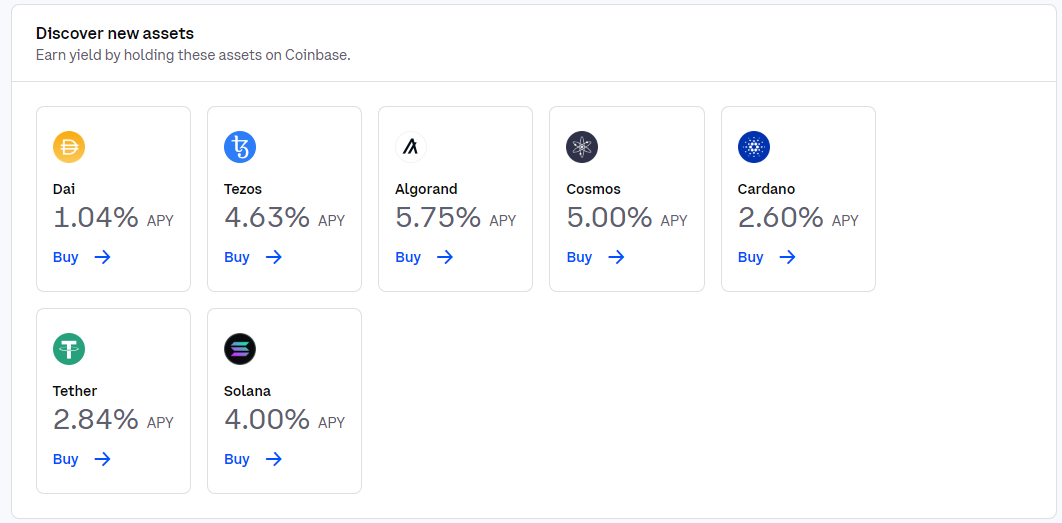
KuCoin has one of the best crypto interest hubs on the market. The primary product, KuCoin Earn, supports idle income generation on various prominent cryptocurrencies. This includes the basics like Bitcoin, Ethereum, and some lesser-known altcoins. The interest rates vary from poor (Bitcoin is less than 1%) to industry-leading (ATOM 15+%). KuCoin runs regular promos that boost these rates for a short period of time. In addition, advanced users can enjoy KuCoin’s other earning models, including a Bitcoin mining pool, margin lending and a jackpot.
Winner: KuCoin.
Coinbase offers an excellent interest service for beginners. The platform is incredibly user-friendly and has some attractive APYs. However, KuCoin’s earn program supports more currencies, pays higher interest rates, and is more flexible. Experienced investors can also leverage Kucoin’s pioneering jackpot and mining products for extra income.
Coinbase vs KuCoin: Buying & Selling NFTs
Coinbase has spent the past few years refining its NFT marketplace, turning it into a well-curated platform. Customers can access several blue-chip NFT collections, such as Terraforms and pumpkins.
KuCoin’s NFT hub is similarly impressive. The development team partnered with Windvane to provide customers with some of the most popular NFTs. Perhaps the most intriguing feature is “Fractional NFTs”. The fractionalization of assets has come into vogue in the past few years, as it allows investors to buy items that would be previously out of reach. This way, someone could buy 1/10th of a Bored Ape NFT worth $500k, instead of missing out on the opportunity.
Winner: Draw.
The scope of KuCoin’s NFT marketplace gives it an edge. However, the depth of its assets on sale is yet to catch up to the platform’s potential. Coinbase has an easy-to-navigate NFT marketplace with several popular NFTs on sale but lacks the flexibility of KuCoin’s service.
Coinbase vs KuCoin: Ease of Use
Coinbase is intended for beginners, and making its platform easy to buy, sell, and trade crypto is a top priority. Navigating the Coinbase website is simple for complete novices. Finding all of the platform’s services is a breeze, with most features just a click or two away. In addition, the aesthetic is modern and sleek, and Coinbase’s design team is constantly making improvements.
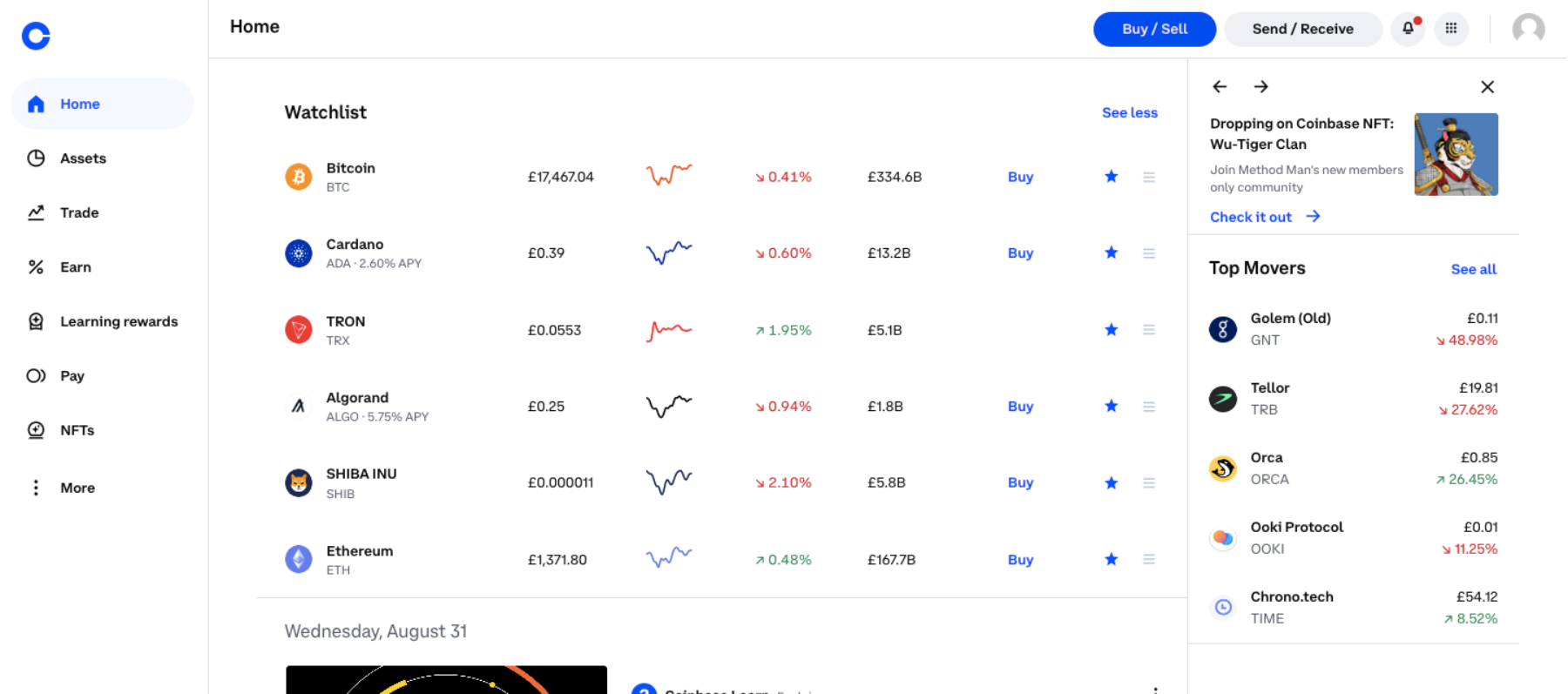
Since KuCoin is such a comprehensive exchange, the platform lacks ease of use. New customers may need to spend significant time navigating the various features, apps, and market lists. Even if the massive range of features doesn’t scare off beginners, KuCoin’s design isn’t the most visually appealing on the market. However, once customers get used to the platform, it becomes fairly easy to find everything.
Winner: Coinbase.
KuCoin’s user interface isn’t exactly beautiful, but it will suffice for most experienced investors. It’s key to remember that KuCoin simply isn’t intended for beginners, whereas Coinbase accommodates all levels of crypto traders. Coinbase’s platform is renowned for being beginner-friendly, and ease of use is one of its specialties.
Coinbase vs KuCoin: Supported Crypto
Coinbase supports most cryptocurrencies that intermediate traders would desire. This includes big players like Bitcoin, Ethereum, and BNB, on top of altcoins (STEPN, UPI) and stablecoins (Tether, USDT). Overall, Coinbase’s list of digital currencies exceeds 200, although trading certain assets is location-restricted.
KuCoin has one of the largest lists of altcoins of any cryptocurrency exchange. All up, the platform supports 700+ cryptocurrencies – with only the most obscure of altcoins absent from the exchange.
Winner: KuCoin.
When it comes to supported cryptocurrencies, KuCoin is hard to beat. Coinbase will have enough options for most beginner-intermediate investors, but more advanced traders will prefer KuCoin’s excellent altcoin depth.
Coinbase vs KuCoin: Trading Experience
The Coinbase trading experience is simple and reflects its beginner-friendly philosophy. Users can simply click “Buy”, “Sell”, or “Convert”, choose their desired assets, and execute the trade. The platform lacks the most advanced order types and trading tools, like customizable charts, stop losses, and order book access.
KuCoin’s trading experience is on par with everything you’d expect from a modern trading exchange. The platform has a “Fast Trade” service, which requires minimal expertise and closely resembles the Binance trading hub. However, the main trading interface includes a customizable chart with hundreds of indicators, various order types, derivatives, and margin trading with up to 100x.
Winner: KuCoin.
For beginners, Coinbase is an excellent cryptocurrency trading solution. However, anybody with a solid level of experience will find KuCoin to be a substantially more flexible and satisfying trading platform with a broad range of crypto markets to speculate on. Moreover, KuCoin has a solid copy-trading platform for cryptos which is not offered on Coinbase.
Coinbase vs KuCoin: Trading Fees
Coinbase has a rather complicated fee structure that isn’t totally transparent. This contradicts Coinbase’s generally beginner-friendly philosophy – although newcomers may be less aware that fees can significantly alter profit margins. There is little documentation online about Coinbase’s trading fees, which are reportedly variable. Some customers have suggested fees of ~1.49% are the norm.
KuCoin also has a complicated fee structure – but not for lack of transparency. The platform’s fees are cost-effective and industry-standard for a high-volume trading platform. KuCoin will charge takers and makers a max transaction fee of 0.1%. This can be lowered to 0.0125% for professional traders with heavy volumes. Derivatives trades are 0.02% for makers and 0.06% for takers.
Winner: KuCoin.
KuCoin’s fees are some of the cheapest on the market with a 0.1% trading fee for the major assets. It is a much more cost-effective platform than Coinbase, no matter your experience level, which charges up to 1.49% per trade.
Coinbase vs KuCoin: Mobile App
Coinbase’s mobile app is one of the best in the business. It has the same sleek, modern aesthetic as the desktop feature. This makes it super easy to keep tabs on your portfolios and monitor your assets on the go. The interface is intuitive and easy to use, and customers can access most of the features from Coinbase’s desktop exchange. The smartphone app has been downloaded over 2 million times and has an average star rating of 4.5/5.
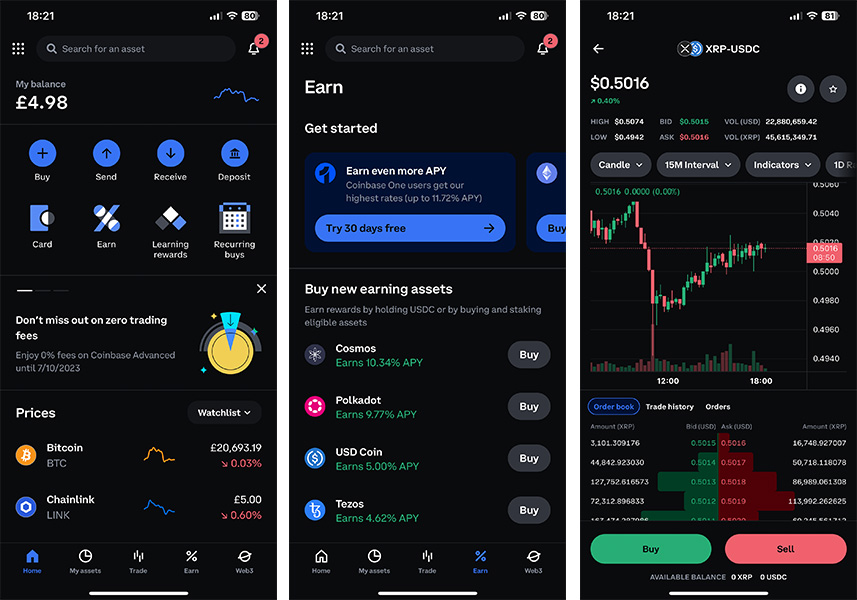
KuCoin’s app provides desktop users with everything they’d expect from the exchange. Live trading, portfolio management, and earning programs can all be accessed in the palm of a hand. Contrary to the KuCoin main platform, its mobile app is actually quite simple to navigate. That said, there is still a lot going on, and the screen can quickly appear quite cluttered. Nevertheless, it has been well-received by its customers, with an average star rating of 4.5/5 across both Google and Apple app stores.
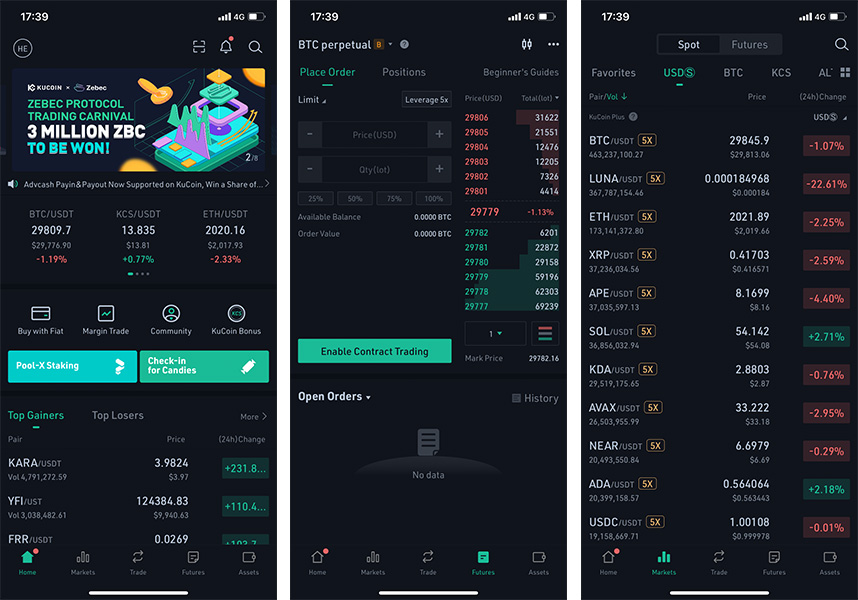
Winner: Coinbase.
Coinbase narrowly takes the win here, due to the sheer stature of its mobile app. 2 million downloads is an impressive feat for a cryptocurrency exchange, and the development team puts a lot of emphasis on updating the app and resolving any bugs. KuCoin’s smartphone offering is still an excellent entrant into the market and is worth a try for those wanting advanced trading tools.
Coinbase vs KuCoin: Customer Support
As a beginner-friendly exchange, Coinbase has put significant effort into improving its customer support services. The platform offers a knowledge center with hundreds of articles and guides to answer most FAQs. Users can also access customer support reps via phone lines, email forms and 24/7 live chat. Unfortunately, the sheer size of Coinbase’s user base can make it hard to contact customer support. This is reflected by the platform’s meager 1.6/5 score on TrustPilot (from thousands of reviews).
KuCoin’s customer support has a relatively poor reputation in the industry, although this isn’t fully deserved. A vast range of customer support options is available – an in-depth FAQ center, a 24/7 live chatbot, and ticket submission. However, the representatives can be very difficult to contact, and although they try their best, they aren’t always helpful due to language barriers. KuCoin has the same Trustpilot rating as Coinbase at 1.6/5.
Winner: Draw.
Neither platform is renowned for its customer support services. Coinbase provides a live chat that is only available in certain regions. Generally speaking, Coinbase’s customer support is better than KuCoin’s for Americans, but not for other countries.
Coinbase vs KuCoin: Security
Coinbase has been in the crypto scene for 10+ years and has only encountered minor security issues. The company utilizes bank-like security, including cold wallet storage of user assets, modern data encryption, and 2FA. The platform received ISO 27001 certification and is one of the few crypto exchanges to have done so. Overall, Coinbase is one of the most secure platforms in the crypto world. Customers should feel safe storing their funds temporarily. However, it’s important to remember that keeping cryptocurrency in a third-party hardware wallet is always the safest storage method. As we’ve seen with the FTX exchange collapse, holding crypto even on “reputable” platforms can be risky.
KuCoin is innately a less-trusted platform due to its lack of regulatory oversight. Because many customers can trade without knowing your customer (KYC) requirements, the platform is a little more susceptible to criminal activity. In terms of keeping users' funds safe though, KuCoin is a relatively solid option. They offer all the industry-standard security measures, such as 2FA, address whitelisting, and cold wallet storage. Although the crypto platform was hacked in September 2020, thanks to an insurance fund, customers didn’t end up losing any money.
Winner: Coinbase.
Coinbase has built a strong reputation for security, and its decade in the industry without major incidents has only served to cement this. Users tend to be a bit more skeptical regarding KuCoin, largely because of its unregulated nature. KuCoin is generally a safe exchange, but Coinbase’s clean track record and ISO 27001 recognition give it a clear edge.
Final Comparison Scores
To conclude this comparison of which exchange is better between KuCoin and Coinbase, each crypto exchange has been scored using simple evaluation criteria as shown below.
| Comparison Criteria | Winner |
|---|---|
| Features, Products and Services | KuCoin |
| Ease of Use | Coinbase |
| Trading Experience | KuCoin |
| Trading Fees | KuCoin |
| Mobile App | Coinbase |
| Security | Coinbase |
| Customer Support | Draw |
